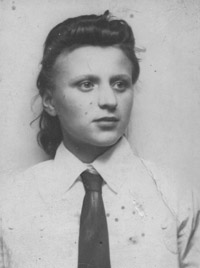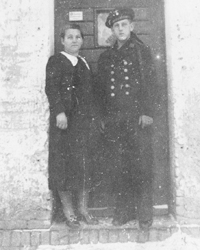|


Germany (1921)
Sources:
Klaus Hildebrandt (great-nephew) / Dorsten
Fritz Mareck (brother) / Dorsten
Bundesarchiv Abteilung PA
1 During the Battle of Tannenberg, the region around Neidenburg was heavily fought over.
|
Ernst Mareck was born on December 5, 1921 in the East Prussian town of Bladiau in the Heiligenbeil district. The small town with its own post office had 1,200 inhabitants and was located around 40 km southeast of the state capital of Königsberg. The Mareck family fled to Bladiau from their home in the Neidenburg district in August 1914 to escape the fighting between the German and Russian armies1. After the war, the family stayed in Bladiau. His father, Gustav Karl Mareck, had grown up in the village of Camerau and was a construction worker by profession. His wife, Minna, née Sutka, came from the neighboring community of Roggen, just 6 km away. In 1911, the two eighteen-year-olds married shortly after the birth of their daughter Hedwig. A son named Otto followed the following year. Between 1912 and 1914, the young father did his military service. Then the World War came and with the mobilization he had to immediately enlist again, while his wife, son and daughter fled the fighting in the west of East Prussia to Bladiau. After the war, the father found work in Bladiau and the family found a new home there. They bought a semi-detached house in a small, newly founded settlement on the outskirts of the town. The house had a one-hectare garden.
|
|
|
2 NSKK = National Socialist Motor Corps
|
In December 1921, Ernst Mareck was born and grew up in Bladiau. In 1924, another brother, Gerhard, was born. The last to arrive was Fritz Mareck, born in 1931. Ernst Mareck was already nine years old and attended elementary school in Bladiau. After leaving school, he began an apprenticeship as a gardener, but did not complete it. Instead, he got his driver's license with the NSKK2 and worked as a truck driver. As a teenager, Ernst Mareck joined the Hitler Youth. He enjoyed the group's excursions and activities, got involved, and was promoted to the rank of squad leader. As such, he led a group of around 30 to 60 boys. Due to the proximity to the Frisches Haff, which was only six kilometers from Bladiau, Ernst Mareck grew up with the sea. So it is not surprising that after the start of the war he volunteered for service in the Navy. He joined the navy on April 1, 1940. The first station in his military career was basic training with the 11th Schiffsstammabteilung in Stralsund. This lasted two months, then Ernst Mareck and most of his comrades were assigned to the crew of the battleship Bismarck, where he would later become part of the air defense. As the Bismarck was still in the final phase of construction at the shipyard, the sailors initially moved into the barge New York in Gotenhafen. In this way, Ernst Mareck came significantly closer to his homeland, but it was still too far away for him to visit in his limited free time. However, the city of Danzig was very close by and was a popular place for sailors to visit, as there was much more going on here than in the naval town of Gotenhafen.
 In Danzig, Ernst Mareck met Greta Damps. They became friends and soon fell in love. In August 1940, Ernst Mareck had to say goodbye; the New York sailed to Hamburg, where he took up his new command on the Bismarck. He was all the more pleased when the battleship set sail for the Baltic Sea again in September 1940 and later. Gotenhafen became his home port during his training period in the Baltic Sea. This gave him another opportunity to visit his girlfriend. During his short time in the navy, Ernst Mareck also spent a home leave in Bladiau. This was in the winter of 1940/41, probably over the Christmas period. He proudly showed his family his blue uniform and posed for photos with his siblings and mother.
In Danzig, Ernst Mareck met Greta Damps. They became friends and soon fell in love. In August 1940, Ernst Mareck had to say goodbye; the New York sailed to Hamburg, where he took up his new command on the Bismarck. He was all the more pleased when the battleship set sail for the Baltic Sea again in September 1940 and later. Gotenhafen became his home port during his training period in the Baltic Sea. This gave him another opportunity to visit his girlfriend. During his short time in the navy, Ernst Mareck also spent a home leave in Bladiau. This was in the winter of 1940/41, probably over the Christmas period. He proudly showed his family his blue uniform and posed for photos with his siblings and mother.
 In May 1941, Ernst Mareck, who had recently been promoted to ordinary seaman, 1st class, set out on his first combat mission on the Bismarck. He did not survive the sinking of his ship. He died at the age of 19. His younger brother Gerhard and his mother did not survive the war either. Gerhard Mareck was killed in action in Latvia on August 7, 1944, and his mother died in a Russian air raid in March 1945. His father had to flee again and lost his homeland for the second time. Together with his youngest son Fritz, he reached Kiel-Friedrichsort in Schleswig-Holstein. In May 1941, Ernst Mareck, who had recently been promoted to ordinary seaman, 1st class, set out on his first combat mission on the Bismarck. He did not survive the sinking of his ship. He died at the age of 19. His younger brother Gerhard and his mother did not survive the war either. Gerhard Mareck was killed in action in Latvia on August 7, 1944, and his mother died in a Russian air raid in March 1945. His father had to flee again and lost his homeland for the second time. Together with his youngest son Fritz, he reached Kiel-Friedrichsort in Schleswig-Holstein.
|
|